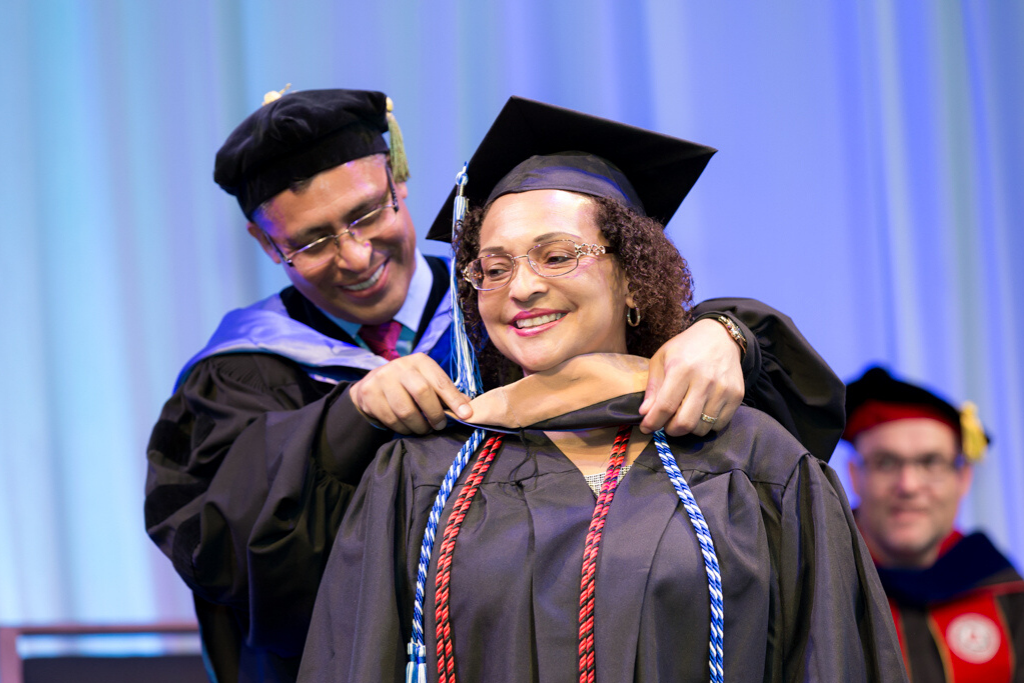Nurses decide to advance their education for many reasons. An increase in income, more job opportunities, and personal achievement are just a few. If you are considering advancing your education, consider pursuing a Master’s Degree in Nursing (MSN) in Nursing Education. While the nursing shortage continues, qualified and credentialed nurse educators are needed. In addition to teaching positions at colleges and universities, there are several career paths available to nurses who hold an MSN in Nursing Education.
What is a nurse educator?
A nurse educator is a registered nurse (RN) with an advanced nursing degree. They combine their clinical skills and expertise with teaching to train the next generation of nurses, as well as educate nurses currently in the industry. Many nurse educators continue to work in clinical settings in addition to the classroom. Nurse educators have clinical experience, expertise, skills, and a desire to teach:
- Nurses
- Nursing students
- Patients
- Communities
- Other health professionals
There are professional opportunities in colleges and universities, community involvement, and clinical settings.
Education, training, and certification
Nurses interested in obtaining an MSN in Nursing Education must be RNs with a Bachelor’s in Science in Nursing or Associate Degree in Nursing prepared RNs who enroll in an RN to MSN program. Upon completion of a program, students are equipped with:
- The foundations for student or staff instruction
- A comprehensive education grounded in nursing theory and research
- Practical knowledge of legal and ethical issues in healthcare
- Specialized skills in areas such as teaching strategies and curriculum development
- Preparation for a wide variety of employment opportunities
RNs interested in becoming certified in the nurse educator field will have the advantage of being set apart from other nursing with the same degree. The National League of Nursing offers the certifications of certified nurse educator (CNE) and certified academic nurse educator (CNE-CL). To hold either certification, candidates must be eligible for, complete, and pass an exam. The CNE is most common, and eligible candidates must:
- Hold an active, unrestricted RN license
- Hold an MSN or DNP with
- Emphasis on nursing education or hold a post-master’s certificate in nursing education or a minimum of nine credit hours of graduate-level education courses
Certification allows nurses to demonstrate expertise and competencies in nursing education.
What can you do with an MSN in Nursing Education?
While most nurse educators pursue careers in the classroom, there is opportunity beyond the classroom. Nurse educators can:
- Write grants
- Conduct or assist in research
- Consult with hospitals and other healthcare facilities to develop staff training and policy and procedure
- Consult with teaching institutions, colleges, or universities to develop or evaluate curricula
- Become clinical instructors or supervisors
- Serve as department chairs
- Write and review textbooks
- Study trends and publish in nursing or healthcare journals
- Became staff development directors
Nurse educators have the clinical skills, knowledge base, and education to bring value to any of these areas.
 Some nurses choose to take their knowledge and credentials and pursue entrepreneurship. Alvionna Brewster MSN-Ed, RN, a registered nurse of 15 years, from Texas states, “I decided to pursue a Master’s in nursing education simply because I just wanted it. Getting a graduate degree was a personal goal of mine. I knew that it would provide better opportunities for career advancement and would help to solidify my nursing career. I chose to pursue Nursing Education out of my love of teaching. When I went back, I had already been in entrepreneurship for years. MSN-Education expanded my view and ownership over my career. It taught me about the advanced nurse’s responsibility for
Some nurses choose to take their knowledge and credentials and pursue entrepreneurship. Alvionna Brewster MSN-Ed, RN, a registered nurse of 15 years, from Texas states, “I decided to pursue a Master’s in nursing education simply because I just wanted it. Getting a graduate degree was a personal goal of mine. I knew that it would provide better opportunities for career advancement and would help to solidify my nursing career. I chose to pursue Nursing Education out of my love of teaching. When I went back, I had already been in entrepreneurship for years. MSN-Education expanded my view and ownership over my career. It taught me about the advanced nurse’s responsibility for
- Advocacy
- Education
- Elevating our profession
It challenged me to be a change agent and a servant leader. It presented me with tools to help solve issues such as healthcare disparities and the nursing shortage. It helped to strengthen my pride and accountability for my career.
I went into MSN-Education knowing that my ultimate goal was not necessarily to become an instructor in a university. My vision was different. My vision was to have my own educational empire with both community and clinical resources. One of my business models focuses on this. I get to merge my knowledge and skillset of nursing with my love of teaching to empower, inspire and impact those who I come in contact with. Helping people to live a healthier, more prosperous life is my purpose.”
If you’re ready to advance your career and education and enjoy teaching, consider an MSN in Nursing Education. Nurses who hold this graduate degree can:
- Develop and manage an interactive and engaging nursing curriculum
- Evaluate and revise educational resources, courses, and programs
- Measure learning outcomes
- Integrate evidence-based theories to support critical thinking
- Prepare nurses for clinical and academic roles
- Assess the health needs of diverse populations for educational purposes
- Facilitate learner development and socialization
- Analyze evidence to guide student learning and assessment strategies
You can excel in working in hospitals or other healthcare facilities, colleges and universities, in your community, or even pursue entrepreneurial endeavors.
If you’re interested in a nursing education career, Aspen University offers online RN to BSN, specialized MSN, and DNP (Doctor of Nursing Practice) programs to help you get there. Seeking an RN license? Check out the BSN (Pre-Licensure) program.
 Portia Wofford is a nurse, writer, content manager, and nurse consultant. Spending her nursing career creating content and solutions for employers that affected patient outcomes, these days Wofford strives to empower nurses by offering resources for mental wellbeing–while helping healthcare organizations and entrepreneurs create engaging content that connects and converts. Follow her on Instagram and Twitter for her latest.
Portia Wofford is a nurse, writer, content manager, and nurse consultant. Spending her nursing career creating content and solutions for employers that affected patient outcomes, these days Wofford strives to empower nurses by offering resources for mental wellbeing–while helping healthcare organizations and entrepreneurs create engaging content that connects and converts. Follow her on Instagram and Twitter for her latest.

